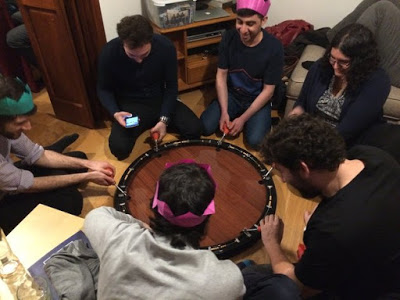Hosting Refugees Has Taught Me So Much About The Kindness Of Strangers
 |
| Sara Nathan 02.01.2018 |
A spectator might think that hosting a destitute refugee or asylum-seeker, as we have done for over a year, would be completely one-way: that all the benefits are to the guest who gains somewhere warm and dry to sleep, the support of a host family, an induction into British life and lots of opportunities to improve their English language skills too.
I host through Refugees At Home, which I helped set up nearly two years ago now and has hosted for over 55,000 individual person nights. We currently have about 150 guests placed and of course the benefits to them are palpable and obvious.
But what about the benefits to the hosts? Well, I have learnt a lot, and not only about Syria, from where my guests have fled (we host about 34 nationalities but my part of West London is very popular with Syrians, as there is already a large community here). Everyone hears about Damascus and Aleppo but I now know about life under fire in Saraqip, near the north-west border with Turkey and about being a family under siege in Deir ez-Zor, in the east near the Iranian border. About how our guest’s mother and sisters had to flee to the desert and live in tents for weeks while their town was under attack. That they then had to flee to Aleppo – which is relatively safe now – then back to their looted home.
It’s not surprising our guest has been rather sad and anxious – but goodness I now understand the importance of the mobile phone and access to wifi.
I have also learnt about what it means to live here in the UK when you have no friends, no idea how the system works, no status and little English. Often it’s not good things I now know: how completely incompetent our Home Office is – and sometimes how this incompetence appears wilfully malicious – though that might be just incompetence and due to lack of communication to an unimaginable degree.
I now know that the Home Secretary can commit contempt of court with impunity and in a way that would have had an ordinary person in prison (three High Court orders flouted and obedience ONLY to the Supreme Court?).
I know that asylum-seekers can be detained indefinitely in a pseudo-prison, with no trial and no end-date. We’ve found that banks do their best NOT to have refugees as customers but that you can’t get benefits unless you have a bank account. I know that almost everyone, including their own communities, exploits new refugees who want to find work. I know the minimum wage – let alone the London living wage – is largely a joke for refugees.
But I also know that individuals can be humane and helpful, that the job centre is not only a place of terror that smells of piss, but has real humans working there, that the DWP people on the end of the phone in Belfast are as nice as possible, that the colleges try hard with ever-decreasing resources, that the NHS still does its best for everyone.
And I meet people I never would have met except through hosting: a whole range of young people (mostly) who have fled Syria and Sudan, Eritrea and Ethiopia, Iran and Iraq. They all have their stories, their ways of getting here. None of it is dull, often it is really moving.
And I have met so many other hosts. The one thing they have in common is that they are open, warm and kindly. They make for very good friends, the neighbours you dream of having… people you can rely on, the sort who will step in, will contribute, will buck you up in moments of darkness and doubt. These are not the dreary, who pass by on the other side and let others get on with it. These are the people who contribute to equipping an empty flat so three young refugee women can move in for the Christmas holidays and then who turn up to sort out the boiler on Christmas eve because the contract cleaners unplugged everything.
Then there is the gastronomic exchange. My current guest thinks my cooking impossibly bland and English – though he rates my roast potatoes and baked apple – but he doesn’t just whinge, he cooks. So we have makloubah or minced lamb with potatoes or chickpeas and spinach with rice. Have you tried Eritrean bread? If you host, you will. The only person who really suffers is Tim the butcher, who doesn’t do halal meat and has thus (temporarily?) lost our custom.
And the cultural exchange. I now really appreciate what Ramadan means, having lived through it, albeit vicariously, and watched our first guest’s cheekbones sharpen though his temper never shortened. Our guests celebrate Hannukah with us, and Christmas too. It brings joy to us and to our family and friends.
For other hosts – and they range in age from 20 to well over 90 – hosting can be companionship for the single/widowed or the stay-at-home/work-at-home, it can be company for the cat while the host is away, it can be a way into another culture or faith, it can be something that gives the retired or even the very successful, a sense of purpose, of giving something back. And you can do it without having to travel to a refugee camp, volunteer at a drop-in or food-bank or donate vast sums.
For me, it’s a surprisingly easy, and stimulating way of sharing my relative good-fortune with people who really need it, and whom I hope will stay a part of my life even when they have moved out and on and up.


